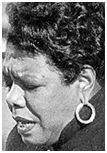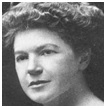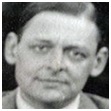|
 |
|
 |
|
|
||
Poetry - Empowerment and motivation
Maya Angelou (1928-2014), Still I Rise The American poet (pictured right) describes the will to win and overcome difficulty and prejudice (particularly as she is an African American):
You may write me down in history With your bitter, twisted lies, You may trod me in the very dirt But still, like dust, I'll rise. (first verse)
Maya Angelou, Caged Bird (1994)
In this poem Angelou also praises freedom for the oppressed who are like a “caged bird”:
The caged bird sings with a fearful trill of things unknown but longed for still and his tune is heard on the distant hill for the caged bird sings of freedom. (last verse).
This is reminiscent of Paul McCartney's (pictured right) Beatles 1967 song, Blackbird.
Blackbird singing in the dead of night Take these broken wings and learn to fly All your life You were only waiting for this moment to arise.
Black bird singing in the dead of night Take these sunken eyes and learn to see all your life you were only waiting for this moment to be free. (first two verses)
James Russell Lowell (1819-91), Stanzas on Freedom (1843) The American poet (pictured right) indicates the importance of freedom to empowerment:
True freedom is to share All the chains our brothers wear, And, with heart and hand, to be Earnest to make others free!
Emma Lazarus (1849-87), The New
Colossus The American poet's (pictured right) words of freedom are written on a plaque inside the Statue of Liberty in New York:
Not like the brazen giant of Greek fame, With conquering limbs astride from land to land; Here at our sea-washed, sunset gates shall stand A mighty woman with a torch, whose flame Is the imprisoned lightning, and her name Mother of Exiles. From her beacon-hand Glows world-wide welcome; her mild eyes command The air-bridged harbor that twin cities frame. “Keep, ancient lands, your storied pomp!”, cries she With silent lips. “Give me your tired, your poor, Your huddled masses yearning to breathe free, The wretched refuse of your teeming shore. Send these, the homeless, tempest-tost to me, I lift my lamp beside the golden door!” (complete poem)
Marianne Moore (1887-1972), I may, I might, I must The American poet (pictured right) emphasizes the importance of a positive attitude. In response to someone saying that a fen is “impassable”, she writes: ... I then will tell you why I think that I can get across it if I try. (lines 2-4)
Gwyneth Lewis (1959- ), One person can make a difference
(2006) The Welsh poet (pictured right) wrote this poem for Holocaust Memorial Day 2006. The fight for justice starts and ends with me. Truth is the sound of what I may say. I can only be well when others are free And right has a price I'm prepared to pay. (first verse)
Ella Wheeler Wilcox (1850-1919),
Resolve (1883) The American poet (pictured right) says have the will (or resolve) to seize life's opportunities without regret.
Build on resolve, and not upon regret, The structure of thy future. Do not grope Among the shadows of old sins, but let Thine own soul's light shine on the path of hope And dissipate the darkness. Waste no tears Upon the blotted record of lost years, But turn the leaf, and smile, oh, smile, to see The fair white pages that remain for thee. (first verse)
T.S. Eliot (1888-1965), The Dry Salvages (1941) The American-born British poet (pictured right) emphasizes the importance of trying to succeed: Right action is freedom From past and future also. For most of us, this is the aim Never here to be realised; Who are only undefeated Because we have gone on trying
|
|
|
||
|
|
||
| Copyright © wisdomtowin.com 2025 All Rights Reserved | ||
|










